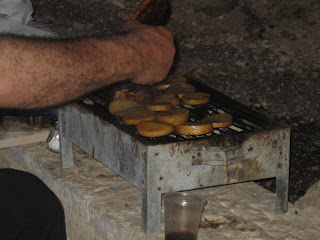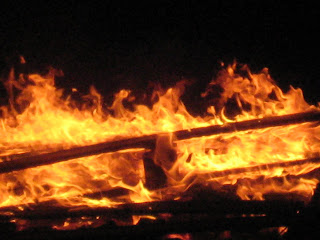I knew, when we came on aliyah, that eventually, I would have to face the one bureaucratic demon I was most afraid to face - converting my driver's license.
I knew that it was a complicated process, involving about 17 disjointed steps. Pay a fee and get this piece of paper here. Get it signed here. Pay this fee there. Get it stamped here, here and here. I completed the first several steps during our first weeks here and then I started ulpan, which provided a legitimate excuse to put the whole project on the shelf.
In reality, I was avoiding the next stage, which involved taking one or more driving lessons and then taking a road test.
There's a rumor among olim that it used to be possible to simply transfer your license from outside of Israel the way you would if you moved from one state in the US to another. Then there was an influx of immigrants with forged licenses who didn't really know how to drive and the policy was changed, requiring all drivers, no matter what country their original license was issued in, to take a minimum of one lesson and pass a road test. I don't even know if the rumor is accurate. But I did know that I would be required to take a driving test to get my license in Israel.
The thought was so anxiety-producing that I avoided it for a few more months.
Finally, I scheduled my lesson. The first time I showed up, I didn't have the right paperwork. The second time, I was able to complete my lesson, but the experience of driving with someone who was watching and judging my every move behind the wheel was totally nerve wracking. Nevertheless, at the end of the lesson, the driving instructor offered me a test date, so I knew I must have done well enough not to require a second lesson.
A week later, on the test date, I was one of three experienced drivers trying to get our American licenses converted. I was the second driver out on the course. My heart was pounding, thumping in my chest as I got behind the wheel. I have been driving for well over three decades, but I felt like a teenager.
Another quirk of the Israeli system is that they don't tell you right away whether you passed or not. Again, the rumor is that once, a driver was told on the spot that he failed the test and he either shot or knifed the tester.
So now you have to wait until the late afternoon and call your driving instructor for the results.
I forgot to mention that, in addition to everything else, I'd already laid out close to 800 shekels (more than $200).
Can it be any more torturous a process?
Yes, it apparently can. Because after some 35 years of driving without so much as a speeding ticket or an insurance claim in decades, I failed my road test.
I failed my road test.
I failed my road test and I plunged into the depths of despair. I began thinking - I am in Israel almost nine months and the job I might have hasn't exactly come together, I can't really speak the language, despite my best efforts in an intensive ulpan and now, I have lost the ability to drive approximately three decades earlier than most adults do. I was hurt and angry and feeling very, very low. I kept noticing flagrant violations made by other drivers. I saw plenty of terrible drivers in Israel. How could it be that I was being denied a license?
Yes, I knew that I had one more chance. I also knew that if I didn't pass a second road test, I would need to take 20 or more lessons, at 150 shekels each, just like a brand new driver.
I was angry, I was hurt and I was highly uncharacteristically down on myself.
Initially, I wanted to avoid everything connected with cars and driving. I thought a lot about how this was going to impact my family, not being able to drive to the grocery store or to take someone to a doctor's appointment. I couldn't think of more than a handful of adults who didn't drive, unless they lived in Israel and had never had a car. I alternated between feeling deeply resentful of a system that was prepared to strip me of my ability to drive with trying very hard to accept this new reality as the will of my Creator. Hashem willed that I not be able to drive anymore and I had to get to the place where I could accept that.
I had to find some spiritual comfort. I told myself that the principles of emunah required me to see this as a good thing. Everything Hashem does it for the good. So my job was to figure out how this could be good.
Maybe it's my destiny to die or worse, to kill someone (Gd forbid!), while I'm behind the wheel. So Hashem took away the chance to fulfill that destiny by taking away the chance for me to ever drive again.
The gemara says that three things are earned through yisurim (suffering) - Torah, Israel and the World to Come. Maybe giving up the ability to drive is part of the price I have to pay to live in Israel.
I thought about it a lot.
Then, last night, while we were sitting in parent-teacher meetings, the driving instructor called and said he had a last-minute cancellation for this morning. I accepted the appointment and told myself the outcome was in Hashem's Hands.
As an extra precaution, I drove home from Jerusalem last night and back into the city this morning, figuring that any recent time behind the wheel might eliminate a small fraction of my anxiety.
By the time I sat behind the wheel of the test vehicle (in Israel, you use your instructor's car for the road test), I felt that I was truly in a place of acceptance. Whatever happened, whatever the outcome of this second chance, it was all in Gd's Hands, not mine.
Baruch Hashem, I passed.

















































